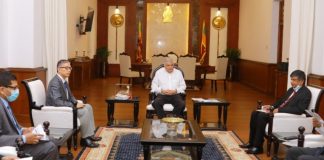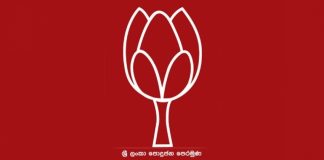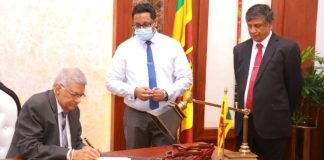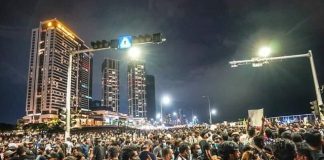Sri Lanka’s bank credit surge in rupees after soft-peg collapse
ECONOMYNEXT – Sri Lanka’s bank credit surged in March 2022 after a collapse of a soft-peg and the value dollar books of banks from inflated in domestic currency as an intermediate regime central bank attempted to regain control of reserve money through a float.
Intermediate regimes (central banks with foreign reserves that also engage in aggressive open market operations to print money and keep interest rates down) are the most dangerous monetary regime invented by mercantilists.
In March 2022 the rupee fell from 201 to the US dollar to 299 based on official data, inflating the rupee value of dollar loans, in the biggest economic crisis triggered by the Latin America style central bank in its 72 year history.
Total credit from the banking system to the government, state enterprises and private firm jumped 1.2 trillion rupees in March, up from 128 billion rupees a a month earlier as dollar books inflated.
Commercial bank credit to government grew 209 billion rupees with 137 billion rupees coming from dollar book inflation.
Credit to state enterprises also grew 310 billion rupees with 77 billion rupees coming from overseas banking units.
Private credit grew 694 billion rupees in rupee terms, with 221 billion rupees coming from overseas banking unit. It is not clear whether domestic units also have dollar borrowings.
Central bank credit also grew 240 billion rupees in March.
Sri Lanka runs from currency crisis to currency crisis due to the intermediate regime central bank which has anchor conflicts in line with the so-called ‘impossible trinity’ of monetary policy objectives triggering exchange and trade controls when money is printed suppress interest rates.
The country’s Latin America style central bank was set up in 1950 and it had gone to the International Monetary Fund 16 times with as the soft-peg came under pressure from low interest rates maintained by money printing.
The lack of any appreciation about the value of monetary stability (sound money) as a foundation for economic growth is found among both third world economists and also in Western prescriptions for the third world, who favour unstable intermediate regimes which place discretion above rules under the guise of central bank independence, critics say.
Sri Lanka itself was following flexible inflation targeting (discretionary domestic anchor) while operating a flexible exchange rate (discretionary external anchor) which led to three currency crises in 2015/16, 2018 and also 2020/2021/2022 which is still under way.
Both legislators and interventionist economists have opposed single anchor monetary regimes (currency board or a clean float), while paying lip service the impossible trinity of monetary policy objectives.
While dollar credit inflated in March, rupee borrowings of private firms also tend to rise as the currency collapse inflates prices and working capital needs grow, analysts have warned earlier when discretionary flexible inflation targeting and output gap targeting became official policy.
Distress borrowings also tend to grow in such countries unless the exchange rate is stabilized.
Analysts have faulted the International Monetary Fund for giving technical assistance to calculate an output gap, which was targeted with liquidity injections, ultimately de-stabilizing a country at peace through a series of currency crises.
Related
How to fix Sri Lanka’s debt crisis, unstable peg, avoid sudden stop event: Bellwether
Sri Lanka is not Greece, it is a Latin America style soft-peg: Bellwether
“The days are gone in which most persons in authority considered stability of foreign exchange rates to be an advantage,” commented Ludwig von Mises, a classical economist.
“Devaluation of a country’s currency has now become a regular means of restricting imports and expropriating foreign capital.
“It is one of the methods of economic nationalism. Few people now wish stable foreign exchange rates for their own countries. their own country, as they see it, is fighting the trade barriers of other nations and the progressive devaluation of other nations’ currency systems.
“Stability of foreign exchange rates was in their eyes a mischief, not a blessing. Such is the essence of the monetary teachings of Lord Keynes. The Keynesian school passionately advocates instability of foreign exchange rates.”
Ironically, East Asia including China until 2005 had some of the strongest exchange rates in the world either orthodox nutral policy currency boards or regimes which are tighter than currency boards where foreign reserves exceed reserve money. (Colombo/May16/2022)
Sri Lanka cabinet to discuss 21st amendment to constitution on May...
ECONOMYNEXT – A proposed 21st amendment to Sri Lanka’s constitution will be taken up for discussion at a cabinet meeting on Monday (16), Prime Minister Ranil Wickremesinghe’s office said.
It will then be presented to the cabinet of ministers for approval, the PM’s office said in a statement.
Several parties have proposed different versions of a 21st amendment, with at least one of them containing provisions to abolish the executive presidency. It wasn’t immediately clear which draft the cabinet would be taking up on Monday.
Wickremesinghe also met representatives of the World Bank and the Asian Development Bank on Sunday (15) for discussions on Sri Lanka’s prevailing economic crisis and possible assistance in the supply of medicine, food and fertiliser.
The newly appointed Prime Minister also met foreign envoys on Saturday (15) where regarding the formation of an international consortium on aid to Sri Lanka.
Related:
Sri Lanka’s new “diplomatic” PM starts foreign aid talks amid political stability concerns
“While explaining that discussions have been positive, the Prime Minister stated that the government is facing the immediate challenge of securing funds to pay for the fuel requirement for this coming week. Due to the dollar shortages in the banks, the government is now exploring other options of securing the necessary funding,” the statement said.
Wickremesinghe is expected to provide a full explanation of the financial crisis in the country on Monday, his office said. (Colombo/May15/2022)
21A to be discussed on Monday (16)
Sri Lanka President calls legislators to work together in Vesak message
ECONOMYNEXT – Sri Lanka’s President Gotabaya Rajapaksa has called for legislators to work together to get the country out of the latest currency crisis triggered by the intermediate regime central bank in a Vesak day message, marking the birth, enlightenment and death of Lord Buddha.
“The Dhamma states, “That deed is well done if one has not to repent for having done it, and if one is delightful and happy with the result of that deed,” the message from the President said.
“Therefore, resilience is essential in difficult situations. At this juncture when the country is in dire straits, all the people’s representatives must work together immediately for a solution on behalf of all citizens.
“The true goal should be to reach the desired target without deviating from the primary goal.
“We must be mindful of the current situation and unite around a programme that can deliver a fair determination to all. That is the Buddhist policy. On this noble day of Vesak, I urge you to use the concept of Licchavi for this purpose and to work together to alleviate the crisis.”
Sri Lanka’s rupee which collapsed from 4.77 to 182 to the US dollar from multiple currency crises triggered by the central bank by printing money to keep interest rates down artificially since it was set up in 1951.
It has collapsed to 380 to the US dollar from 182 in the latest printing bout. Corrective policies in the form of higher interest rates have been made.
After the end of a 30-year war, monetary policy deteriorated with output gap targeting (printing money to boost growth) becoming part of official policy from around 2015, leading to excessive foreign borrowings each time the peg broke and forex shortages emerged.
Sri Lanka is now trying to get 3 to 4 billion US dollars in ‘bridging finance’ under the same policy.
The full statement of President Rajapaksa is reproduced below.
The Buddhists in Sri Lanka, together with fellow Buddhist brethren the world over, perform charitable activities including AmisaPooja and PrathipaththiPooja to celebrate the Vesak, the most important day in Buddhist Calendar.
The Dhamma preached by Gautama Buddha with great compassion for all human beings continued for over two thousand five hundred years. The Bodhisattva practiced toward enlightenment over a period of countless kalpas. It is complete with AmisaPooja and PrathipaththiPooja. Enriched with DasaParami (Ten Perfections) qualities in order to save human beings from the misery of life.
Those who sought refuge in The Buddha, recall the unbounded qualities of the Great Teacher with utmost devotion.Evidences about the virtue of Buddhist teachings, that had not being shaken by the AtaloDahama, depict in Buddhist literature and throughout the character of the Buddha. It is not uncommon for us Buddhists to be shaped by the teachings of those who have worked hard and come up with the most appropriate solutions.
ThanchaKammanKathan Sadhu – Yam KathvaNanuthappathi
YassaPathithoSumano – VipakamPatisevathi
The Dhamma states, “That deed is well done if one has not to repent for having done it, and if one is delightful and happy with the result of that deed.”
Therefore, resilience is essential in difficult situations. At this juncture when the country is in dire straits, all the people’s representatives must work together immediately for a solution on behalf of all citizens. The true goal should be to reach the desired target without deviating from the primary goal.
We must be mindful of the current situation and unite around a programme that can deliver a fair determination to all. That is the Buddhist policy. On this noble day of Vesak, I urge you to use the concept of Licchavi for this purpose and to work together to alleviate the crisis.
May the common goal of all be to build a resilient, consensus and religious society based on principles! I wish you a Happy VesakPoyaDay!
Sri Lanka gets “good response” from envoys, may take 3 months...
ECONOMYNEXT – Sri Lanka has got a ‘good response’ from envoys of friendly countries for financial help, but it may take up to three months to finalize deals, Prime Minister Ranil Wickremesinghe said as a broken soft-peg created forex shortages disrupting imports.
“I spoke with envoys of several countries yesterday and today,” Prime Minister Wickremesinghe said in a video statement.
“The responses are good. But we have to tell them our situation and enter into agreements. It may take two to three months to finish this.”
Sri Lanka’s exports are soaring and imports are also going up but a broken soft-peg is creating forex shortages making it difficult to pay big ticket import bills like petroleum bills.
Sri Lanka imports hit 1.8 billion US dollar in February with exports growing to 1.1 billion US dollars, official remittances a 205 million US dollars and a similar or bigger amount coming through Hawala which is used to pay mostly for food, which is coming through open account imports.
Sri Lanka’s economists broke the unstable peg with two years of money printing to keep rates down and an attempt was made to float the currency in March, but it had not yet succeeded and forex shortages persist.
A float is a complete suspension of convertibility, which stops money printing (sterilized interventions) after reserve sales for imports and reserve money become fixed.
However the float has failed to take hold partly due a surrender requirement which make the regime a peg and pushes the currency down analysts have warned.
India also may be unwittingly contributing to the forex shortage by allowing the use of ACU payments for interventions. Interventions are usually accompanied by money printing to offset a contraction in reserve money adding to the crisis, though rates have been hiked to slow credit.
Earlier in the year in a bizarre move many economists and business chambers advocated the central bank to use reserves for imports (peg) and simultaneously criticized pegging and called for currency to be devalued.
The rupee has since fallen from 203 to 380 and forex shortages persist. Pegs break when money is printed to keep rates down, triggering conflict in money and exchange policies.
However Wickremesinghe blamed fuel shortages on lack of planning, not on monetary instability.
“Yesterday and today reviews were done on the fuel and fertilizer. It shows that because we were not prepared,” he claimed. “We will have to face shortages and problems.”
“In the next few weeks we will face the most difficult time. I think together we can overcome this economic crisis.”
“After that our medium term and long term future can become better. With the IMF also we have talked.”
Unless the float takes hold, high interest rates will persist for longer than necessary with negative impact on businesses and banks, analysts say.
A free floating exchange rate as used in all developed nations does not require any foreign reserves and the entire reserve money is backed by domestic assets. Inflows and outflows of foreign exchange are matched outside the reserve money, with no reserve pass-through.
Sri Lanka faces currency crises, after currency crisis over 72 years due to economists in the country stubbornly refusing to move to a single anchor monetary regime such as a clean float of hard peg (currency board) despite going to the IMf 17 times with broken pegs. (Colombo/May14/2022)
SLPP MPs meet with top Govt officials
Sri Lanka’s new “diplomatic” PM starts foreign aid talks amid political...
ECONOMYNEXT – Sri Lanka’s newly appointed prime minister Ranil Wickremesinghe on Friday started discussions over foreign aids for the crisis-hit island nation’s economic recovery, his office said.
Wickremesinghe, 73, who was handpicked for the job by President Gotabaya Rajapaksa on Thursday, held preliminary talks with foreign envoys representing India, Japan, United States of America, Britain, and China on Friday and the discussions focused on rapid economic recovery in the next few months.
His office did not give any further details on the foreign aid consortium.
“He is trying to get some foreign funding through a donor conference,” an aide close to the prime minister told Economy Next.
Sri Lanka is facing its worst financial crisis since the independence from British colonial rulers in 1948.
It has already suspended its 51 billion US dollar worth foreign debt repayments from April 12 as the island nation has run out of dollars even to buy the essentials for its 22 million people.
Amid extended power cuts due to lack of fuel imports, the 84.5 billion US dollar economy’s people face acute shortage of fuel, medicines, food, cooking gas, and milk powder mainly due economic mismanagement by President Gotabaya Rajapaksa’s ruling Sri Lanka Podujana Peramuna (SLPP).
Wickremesinghe’s appointment came amid continuous protests by hundreds of people near presidential secretariat demanding Rajapaksa, his brother and then Prime Minister Mahinda Rajapaksa along with the SLPP government to step down.
Mahinda Rajapaksa resigned on Monday (09) after his supporters brutally attacked hundreds of unarmed and peaceful protesters near both presidential secretariat and Temple Trees, the prime minister’s official residence, who had been demanding the resignation of the both leaders.
Diplomatic Hiccups
Wickremesinghe’s appointment also came when diplomatic relations with many foreign countries have been severed time to time under Rajapaksa.
Senior government officials have told Economy Next despite repeated request by then foreign minister G L Peiris, many countries declined to respond to his calls after a series of “cardinal errors” in international diplomacy.
Then prime minister Mahinda Rajapaksa unilaterally cancelled 500 million US dollar East Container Terminal (ECT) project which was already signed among India, Japan, and Sri Lanka in 2018.
Similarly, President Gotabaya Rajapaksa unilaterally canceled a Japanese-funded 1.5 billion US dollar Light Railway Transit (LRT) project connecting the commercial heart of capital Colombo to suburbs even after the project was under implementation.
President Rajapaksa also canceled a 480 million US dollar grant from the U.S.-based Millennium Challenge Corporation (MCC) given for rural infrastructure projects. He rejected it on the advice of an expert panel report which said based on the current status of countries which had implemented the MCC granted projects, the fate of those countries is tragic. Sources from US embassy in Colombo, however, had said contents of the expert panel report on the MCC grant was exaggerated and based on unfounded facts.
Rajapaksa government’s close relations with China also led other countries to have a “minimum level” of diplomatic relations with Rajapaksas in the past, officials from the island nation’s foreign ministry have told Economy Next.
China helped Rajapaksas with billions of US dollars in loans for post-war infrastructure between 2010 and 2015 when Mahinda Rajapaksa was the president. But many of the projects yet to give a sizable return on investment to repay the loans, which many Western nations say as “debt trap” and contributed to the country’s debt burden.
However, President Rajapaksa has said China had never dragged Sri Lanka into a debt trap.
Political Maneuvering
The Rajapaksa government also had issues with the European Union on some commitment it had asked to fulfill in return of GSP plus, a trade concession which is annually worth over 500 million US dollars and helped the South Asian island nation’s top exports, garments.
The trade concession was signed in 2016 under the previous government, but Rajapaksa government was hesitant to implement some commitments including removal of four-decades old anti-terrorism law.
When the EU raised the issue, some members of Rajapaksa government publicly said the country cannot compromise the people’s mandate to continue the trade concession. However, the downfall in the economy compelled the government to engage with the EU and finally amend the anti-terrorism law.
The Rajapaksa government also backtracked three renewable energy projects granted to a Chinese firm in the Northern islands after Indian raised security concerns. The Chinese firm was chosen via an internationally accepted bidding process. However, Rajapaksa government unilaterally withdrew the project awarded to China, also unilaterally which resulted in China having reservations on financially assisting Rajapaksa government.
Sri Lanka’s conduct in human rights also has raised international concerns.
Former Finance Minister Basil Rajapaksa gave a liquefied natural gas (LNG) project to a US-based New Fortress Energy in an unsolicited manner while the authorities had received international bids through an internationally accepted process.
As a result of all of these diplomatic hiccups, many countries had hesitated and reservations to financially assist Rajapaksa amid many corruption allegations.
“Diplomatic PM”
Retired Sri Lankan diplomats said the new prime minister stands out in his diplomatic ways of handling the issues.
“He is a diplomatic prime minister. He knows whom to access internationally for what and when,” for retired career diplomat told Economy Next.
“This is why you see all these diplomats meet him just within 24 hours.”
Wickremesinghe in 2002 proved his ability in managing a crisis hit economy.
The island nation’s economic growth contracted in 2001 after Tamil Tiger rebels who demanded for a separate state within Sri Lana destroyed the only airport and complete fleet of state-owned SriLankan Airlines.
Wicktremesinghe became the prime minister after winning snap polls in December 2001 and approached international partners to help the country’s economy to recovery.
His long term efforts helped him to organize ‘Tokyo Donor Conference’ on June 10, 2003 which saw the participation of 51 countries and 21 international organizations.
At the end of the conference, Wickremesinge who personally participated in the event got pledges of over 4.5 billion US dollars for reconstruction and development of the entirety of Sri Lanka.
Sources close to Wickremesinghe said the plan was to have some immediate funding to ensure essentials which are in shortage for the public now.
“Once that is dealt with, his plan is to focus on the debt restructuring and IMF programme,” he told Economy Next asking not to be named.
However, many analysts say it may not be as easy as Wickremesinghe thinks.
Undiplomatic Politician
The new prime minister is seen as a stubborn and elitist leader by his own center-right United National Party (UNP) members.
Already most of the opposition political parties have said they will not support his leadership in the parliament as majority of them consider it as against the people mandate.
Some critics also see his appointment as a way out for Rajapaksas to buy time for them to evade possible prosecutions demanded by most people over the corruption charges and wealth accumulation.
Wickremesinghe’s UNP for the first time in its history failed to win any seat at the 2020 parliamentary polls. He also personally got defeated. However, he entered the parliament through a bonus seat in the 225-member legislature.
Many opposition parties including Samagi Jana Balavegaya (SJB), the Marxists Janatha Vimukthi Peramuna (JVP)-led National People’s Power, and Sri Lanka Freedom Party (SLFP) have declined to back him in the parliament and rejected his request to accept cabinet ministerial portfolio.
President’s SLPP has pledged support to Wickremesinghe, but political analysts say the new prime minister may need support of some opposition members for parliamentary majority.
Many parliamentarians see him as a leader who does not want to listen to their views, some opposition law makers have said.
Wickremesinghe wants the parliamentary majority for a new budget including some tough economic, fiscal, and public sector reforms to ensure a loan from the International Monetary Fund and to go ahead with foreign debt restructuring plans. (Colombo/May14/2022)
UK advises against Sri Lanka travel as soft-peg collapse triggers violence
ECONOMYNEXT – The United Kingdom has advised against non-essential travel to Sri Lanka as the worst currency crisis in the history of the island’s central bank triggered social unrest and violence killing at least nine and angry mobs torched property of ruling party officials.
“The Foreign, Commonwealth & Development Office (FCDO) advises against all but essential travel to Sri Lanka, due to ongoing political and economic instability,” UK citizens were told on May 13.
“This advice does not apply to airside transit through Sri Lanka’s international airport.”
“A State of Emergency has been declared and an island-wide curfew is in place.”
Violence broke out after loyalists of ex-Prime Minister Mahinda Rajapaksa attacked peaceful protestors at a seafront in Colombo on May 09.
At least nine persons including two policemen died in a violent backlash that saw over 100 properties of the ruling Rajapaksa family and party members destroyed.
“Further incidents could take place,” the UK advisory said. “If you are in Sri Lanka at this time, or considering travel, you should avoid all protests and follow the advice of local authorities.”
People are angry after the island’s intermediate regime central bank printed money for two years to target an output gap (Keynesian stimulus) driving inflation to 30 percent, and botched float with a surrender rule sent the rupee careening down from 200 to 380 to the US dollar so far.
The 2022 currency crises came on top of currency crises in 2015 and 2018 which was also triggered by money printed to target an output gap.
Analysts have blamed the International Monetary Fund for teaching the island’s Latin America style central bank to calculate an output gap, triggering a series of currency crises and eventual default.
Though interest rates have been hiked, monetary stability has not yet been restored due the botched float and forex shortages continue, disrupting big ticket imports like fuel and cooking gas.
President Gotabaya Rajapaksa imposed emergency rule, which is set to expire next week unless Parliament approves. The curfews are also being gradually relaxed. (Colombo/May19/2022)




